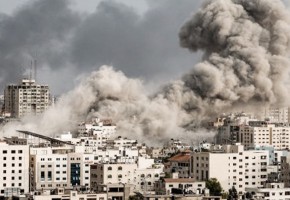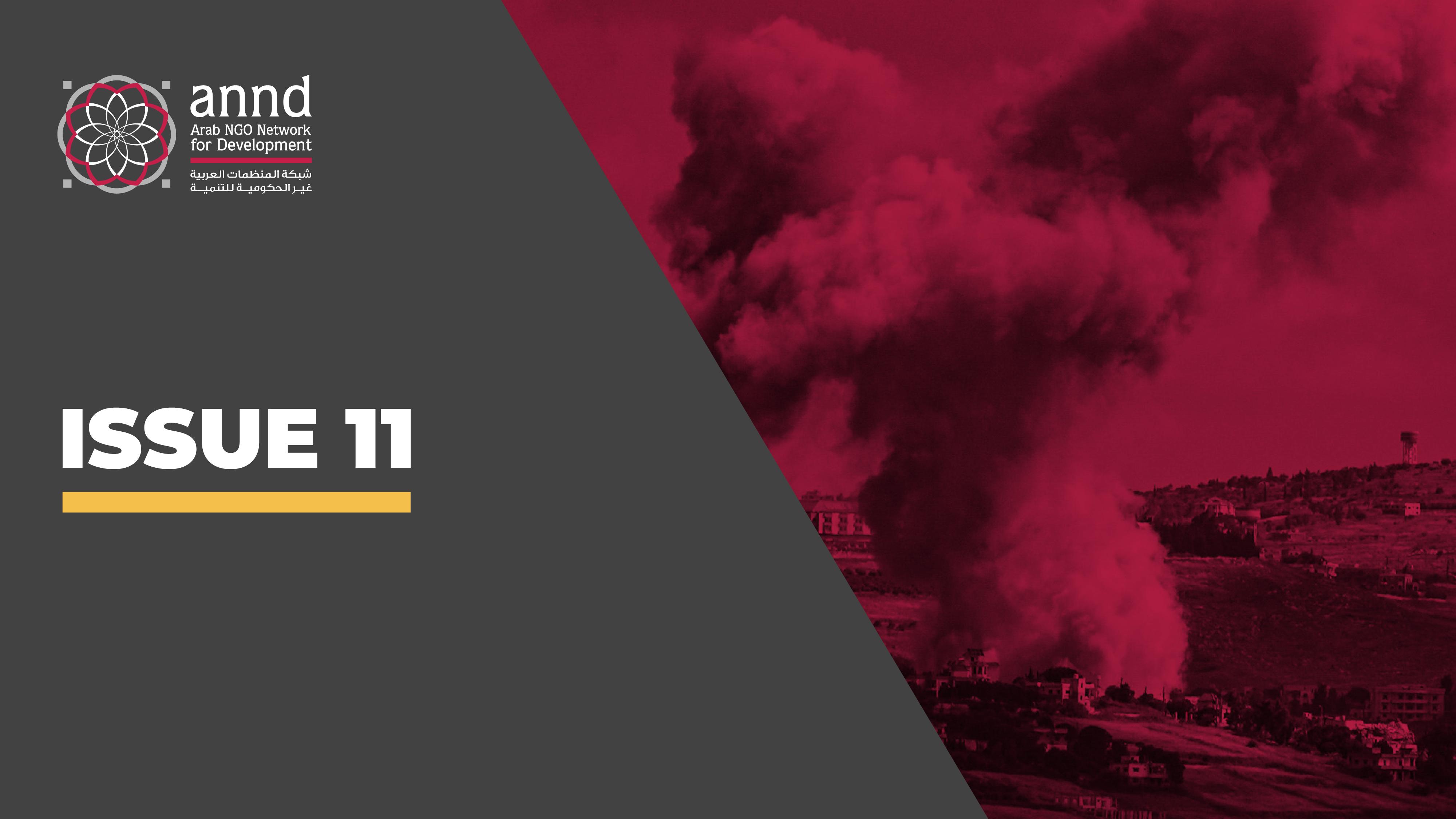
A Region on Fire - Special Edition
Issue 11 - October 7, 2024
A Year of Genocide
On the first anniversary of October 7, attention is drawn to the ongoing Israeli occupation since 1967, as history reaffirms key moments of the long conflict and continuous aggression. This day serves as a reminder of the impact of Israeli occupation on the lives of Palestinians, especially in the context of ongoing repression, violence, land confiscation, and settlement expansion.
October 7 as a Commemoration of the Conflict
October 7 is linked to various events that remind us of the ongoing conflict between Palestinians and Israelis. This date is seen as an opportunity to highlight the suffering of Palestinians under occupation, and how Israeli colonial dynamics and policies continue to affect their daily reality. This day emphasizes the urgent need for a just and sustainable solution that guarantees the legitimate rights of the Palestinian people and ends the occupation and violations.
In this special report on Palestine, and on the first anniversary of October 7, we will focus on the war that primarily targeted the Gaza Strip, which serves as a clear example of war crimes and genocide committed by Israel, backed by documents and evidence cited by the International Court of Justice (ICJ) and the International Criminal Court (ICC). This will be done without diminishing the significance of the accompanying attacks on West Bank residents in cities like Nablus, Jenin, Tulkarm, Ramallah, and other Palestinian areas affected by Israeli military actions.
Since the start of the war on Gaza on October 7, 2023, the West Bank witnessed a significant escalation in Israeli attacks. Israeli military operations in the West Bank included invasions of cities, villages, and refugee camps, resulting in the deaths of more than 660 Palestinians and the arrest of around 10,000 people, including activists and former prisoners. Daily confrontations with Israeli forces continued in various parts of the West Bank. We will revisit the situation in the West Bank at the end of this report.
The Decision to End the War
Contrary to Israel’s claims, its withdrawal of ground forces from Gaza in 2005 did not end its occupation of the territory. Israel maintained effective control over the region, including its territorial waters, airspace, and the movement of people and goods, except for Gaza’s border with Egypt, making it the largest open-air prison in the world.
Since the start of the war on Gaza in October 2023, the United Nations Security Council held around 40 official sessions, most of which focused on the situation in Palestine, especially Gaza. These meetings included discussions on humanitarian conditions, calls for ceasefires, and draft resolutions related to humanitarian aid. Four resolutions were adopted during this period, but the United States used its veto power multiple times to block proposals aimed at reaching a ceasefire.
Genocide
From the very beginning, the United Nations and human rights organizations worldwide warned of the need to intervene to prevent genocide and a humanitarian catastrophe in Gaza, emphasizing that Israel’s actions constitute violations of international humanitarian law, international human rights law, and international criminal law.
On December 29, 2023, the government of South Africa filed a lawsuit with the International Court of Justice against Israel, accusing it of violating its obligations under the “Convention on the Prevention and Punishment of the Crime of Genocide.” The legal memo outlined the criminal intent of Israeli authorities to commit genocide, citing statements from Israeli leaders. The lawsuit concluded with several demands, aiming to secure a judicial ruling condemning Israel for violating its obligations under the convention.
The ICJ held two public hearings, and on May 24, 2024, it called on Israel to immediately cease its military operations in Rafah, southern Gaza, and withdraw its forces, though it did not order a full ceasefire. Israel ignored the court's ruling; Israeli Prime Minister Benjamin Netanyahu stated, "The ICJ will not deter Israel from continuing its war in Gaza until complete victory is achieved."
The ICJ ruling of July 19, 2024, affirmed that Israel's occupation of Gaza and the West Bank, including East Jerusalem, is illegal, just like the associated settlement system, land annexation, and exploitation of natural resources. The court ordered Israel to end its occupation, dismantle settlements, and provide full compensation to Palestinian victims, facilitating the return of displaced persons. The court also rejected the notion that Palestinian self-determination could only be achieved through bilateral negotiations with Israel, a condition that exposed Palestinians to violence, dispossession, and rights violations for 30 years.
According to UN experts, this advisory opinion reinforces the peremptory norms prohibiting land annexation, settlement building, and apartheid, which should be regarded as binding on Israel and all states supporting the occupation.
The UN Special Rapporteur on the situation of human rights in the occupied Palestinian territories since 1967 concluded that there are “reasonable grounds to believe that the minimum threshold required to indicate Israel's commission of genocide has been met.” This came two months after the ICJ ruling warning of a reasonable risk of genocide.
Amnesty International found conclusive evidence that Israel committed war crimes and violated international humanitarian law in its war on Gaza. The organization stated that Israel did not take necessary precautions to avoid civilian casualties, failed to distinguish between military and civilian targets, and directed attacks at civilian sites, resulting in significant civilian casualties and the destruction of entire families.
Human Rights Watch and other human rights organizations also determined that Israeli authorities are committing the crimes of apartheid and persecution, which are crimes against humanity, against millions of Palestinians. The systematic oppression of Gaza’s population forms part of these ongoing crimes.
Israel Before the ICC
In recent years, Palestinian efforts to bring Israel's crimes before the ICC made some progress after the court's Pre-Trial Chamber ruled on February 5, 2021, that it has jurisdiction over the State of Palestine, including the West Bank, Gaza Strip, and East Jerusalem, as a party to the Rome Statute.
The ICC prosecutor is currently overseeing an ongoing investigation, opened by the former prosecutor in 2021, into potential war crimes in Palestine. International organizations have urged the prosecutor to issue a clear statement regarding the court's jurisdiction over the current situation.
In May 2024, ICC Prosecutor Karim Khan told Christiane Amanpour that he was seeking arrest warrants for Hamas leader Yahya Sinwar and Israeli Prime Minister Benjamin Netanyahu on charges of war crimes and crimes against humanity during the attacks on October 7, 2023, and the subsequent war on Gaza. The ICC also seeks arrest warrants for Israeli Defense Minister Yoav Gallant and two senior Hamas leaders, Mohammed Deif and Ismail Haniyeh. The court dropped its request for an arrest warrant against Haniyeh after his death in Tehran in July 2024.
Later, the ICC decided to delay issuing arrest warrants for Netanyahu and Gallant to allow more legal opinions to be submitted. This step followed requests from over 60 countries and organizations seeking to present objections.
In January 2023, a criminal case was filed against Israeli President Isaac Herzog during his attendance at the World Economic Forum in Davos, Switzerland. Although Swiss police did not arrest him or investigate, the lawsuit caused significant concern among Israeli leaders.
Illegal Occupation
In September 2024, the UN General Assembly, by a majority of 124 members, adopted a resolution based on the ICJ’s July 19 ruling, calling on Israel to immediately end its illegal presence in the occupied Palestinian territories within 12 months of the resolution's adoption and to fully comply with its obligations under international law as outlined by the ICJ.
The Deadliest War Since Rwanda
The war on Gaza resulted in the deaths of at least 41,909 Palestinians. Palestinian medical reports estimate that about 10,000 people remain missing under the rubble or in the streets, unreachable by rescue teams.
The Palestinian Ministry of Health reported 97,303 injured, while the Gaza government media office stated that the Israeli army annihilated 902 Palestinian families in Gaza by killing all their members. The army also erased them from the civil registry.
Statistics show that the Israeli army killed 173 journalists, 710 infants, and 11,000 women, leaving 19,000 children without one or both parents, and more than 6,000 families lost their mothers. UN experts noted that many of the bodies found in mass graves bore signs of torture and summary execution, with potential cases of people being buried alive.
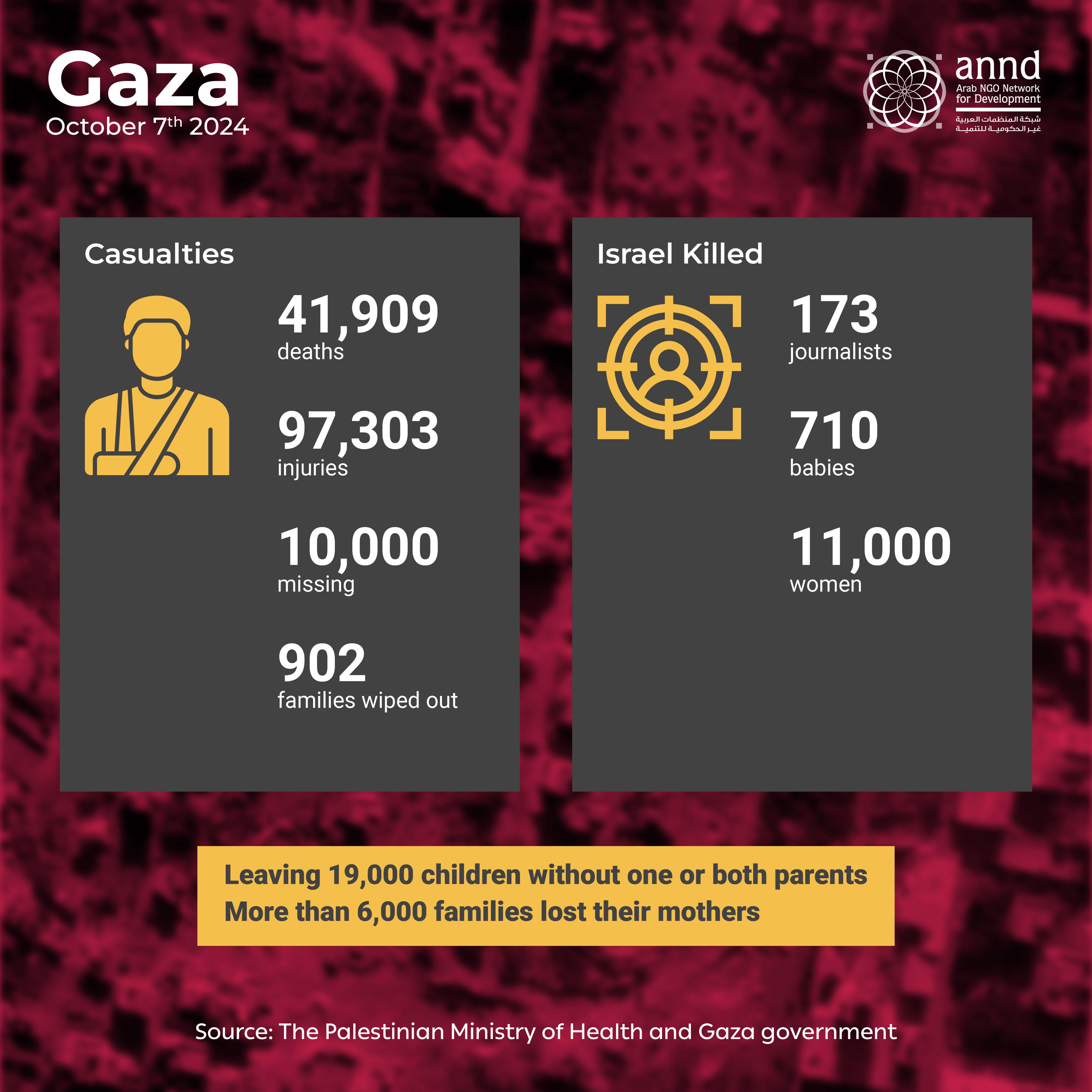
According to the World Health Organization, Gaza recorded approximately one million cases of acute respiratory infections last year. Doctors fear an increase in cancer cases and birth defects in the coming years due to metal contamination.
Gaza is facing an unprecedented food shortage. Sixteen UN-affiliated humanitarian organizations reported that 83% of food aid was blocked from entering Gaza in 2024, up from 34% in 2023. This has led to a reduction in meals to one per day, with about 50,000 children urgently needing treatment for malnutrition. The decline in drinking water desalination has led to the reemergence of polio, which had been eradicated in Gaza for 25 years, prompting the UN to launch a vaccination campaign for over 600,000 children.
A joint statement by the Palestinian Central Bureau of Statistics and the Environmental Quality Authority in June 2024 estimated that only 10% to 20% of Gaza’s water supply is available compared to pre-war levels.
Human rights officials described Israel’s use of water deprivation as a weapon of genocide. Oxfam classified this as a "war crime," noting that Israel continues to block fuel supplies needed to operate Gaza’s remaining water plants, severely limiting access to already scarce water supplies for Palestinians.
Israel intentionally destroyed most of Gaza’s hospitals, put them out of service, targeted medical teams, and blocked the entry of medicine.
Israel destroyed 93% of school buildings, killing over 11,600 Palestinian schoolchildren, 750 teachers, 1,100 university students, and 130 academics.
More than half of UNRWA facilities were bombed, mostly schools, some of which have been completely destroyed and rendered out of service. As of 6 January 2024, 146 of its employees have been killed. It should be noted that UNRWA’s headquarters in occupied East Jerusalem was attacked in May 2024, and that there were various pressures prior to the war on the agency.
Israel also destroyed around 206 archaeological and heritage sites out of 325 in the Gaza Strip, particularly in the "Old City," an ancient city dating back to the Phoenician civilization, which is about 1,500 years old.
The war displaced 1.9 million people in Gaza. According to United Nations statistics, "9 out of 10 people in Gaza have been displaced from their homes at least once, and in some cases up to 10 times," and approximately "305 square kilometers—nearly 84 percent of Gaza's area—were subject to evacuation orders issued by the Israeli military."
More than 10,000 women have been killed in Gaza, and pregnant and nursing women are facing severe complications, suffering from infections, anemia, and high blood pressure. According to a survey by UN Women, approximately 68 percent of the pregnant women surveyed experienced urinary tract infections, anemia, blood pressure disorders, and vaginal bleeding. The lack of sexual and reproductive health services is also a major concern.
This war is considered the most dangerous for journalists, according to Irene Khan, the United Nations Special Rapporteur on the promotion and protection of the right to freedom of opinion and expression. As of May 2024, around 140 journalists were killed during the conflict, according to the Government Media Office in Gaza.
The period before October 7, 2023, is vastly different from what came after for the thousands of Palestinian prisoners in Israeli occupation prisons. Their numbers are the highest in history since 1967, and they have been subjected to horrific crimes, including murder, execution, brutal torture, sexual harassment, rape, starvation, and deprivation of basic human rights. Additionally, at least 53 Palestinians have died in this context over the past 10 months. This year also saw incitement from the Israeli government against the prisoners, with figures like Itamar Ben-Gvir calling for their execution.
Is Gaza livable after the war?
One year after the Israeli military operations, dealing with the massive amount of rubble remains one of the toughest challenges for Gaza’s residents. The United Nations estimated that there are over 42 million tons of debris, including destroyed buildings still standing and collapsed structures.
According to UN satellite data, two-thirds of the buildings in Gaza built before the war are now damaged, with 66% of the buildings affected. A total of 163,778 buildings have been affected, with 52,564 buildings destroyed, 18,913 severely damaged, 35,591 structurally damaged, and 56,710 moderately damaged. UN estimates from April 2023 indicated that clearing the rubble could take 14 years. They stated that this debris is 14 times larger than the amount accumulated after the first war in Gaza in 2008-2009, and five times more than the amount left behind after the Battle of Mosul in Iraq between 2016 and 2017. The UN Development Program indicated that Gaza might need around 80 years to fully restore all the completely destroyed housing units, based on a hypothetical assessment of the pace of reconstruction seen in previous Gaza conflicts.
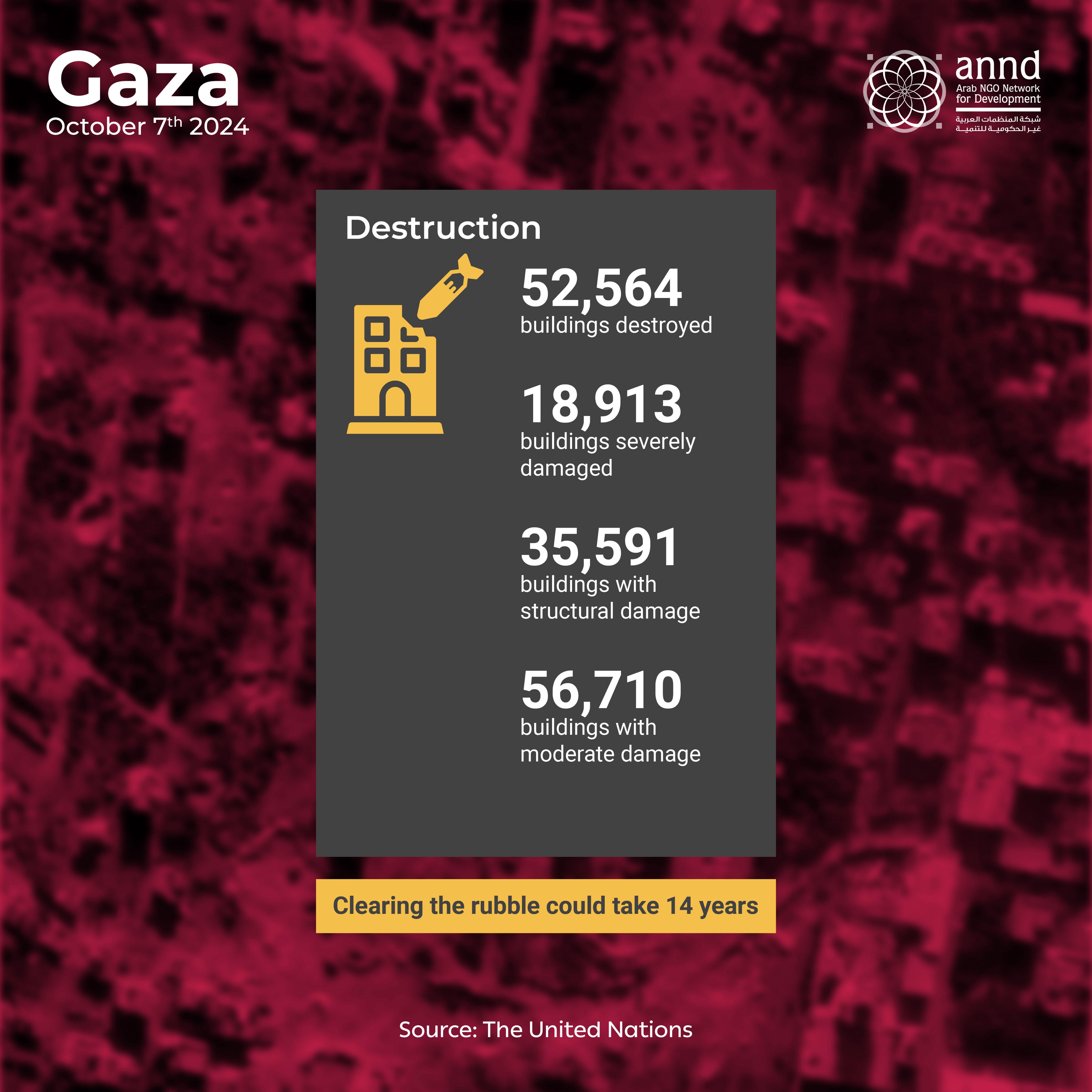
Use of lethal force in the West Bank
The situation in the West Bank continues to worsen, with the number of Palestinian martyrs recorded surpassing any other period since 2005. This increase is due to intensified Israeli military operations and a rise in violent settler attacks on Palestinian communities. Israeli forces have increasingly used military tactics and weapons in law enforcement operations, including air raids targeting villages, especially the Jenin refugee camp.
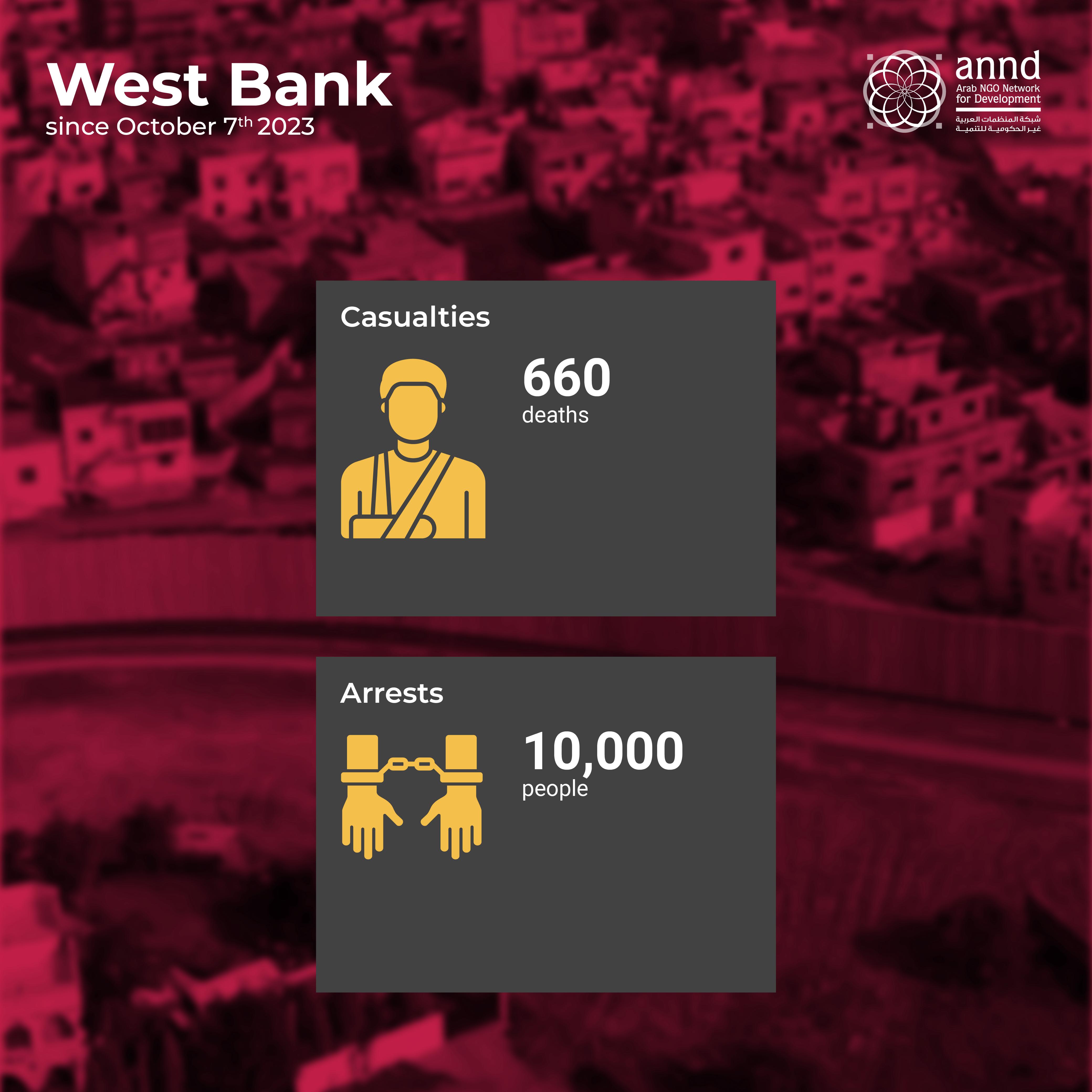
According to a June 2024 report by the UN Independent International Commission of Inquiry on the Occupied Palestinian Territory, including East Jerusalem, and Israel, the Israeli government and forces have allowed, encouraged, and incited violent settler attacks against Palestinian communities in the West Bank. There were reports of 1,270 attacks by Israeli settlers against Palestinians. Additionally, 6,730 housing units were built or approved in illegal settlements, along with the demolition of hundreds of buildings.
The escalation in settler violence has been significant, forcing thousands of shepherds to leave their homes, which may amount to forced population transfer, a serious violation of the Fourth Geneva Convention. Many Palestinian communities are essentially closed off, with roads blocked, numerous checkpoints installed, and freedom of movement restricted. Some of the most vulnerable Palestinian communities have been left entirely isolated, deprived of access to essential goods and services.
Recent publications

ANND Newsletter - March Issue: Financing for Development: Between Transparency and Global Challenges
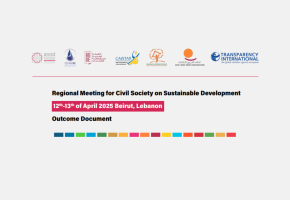
Outcome Document - Regional Meeting for Civil Society on Sustainable Development 2025
Related publications

